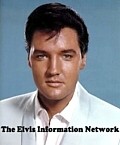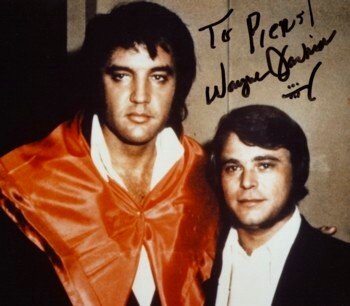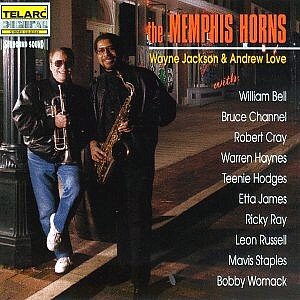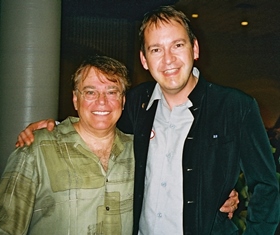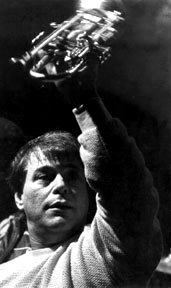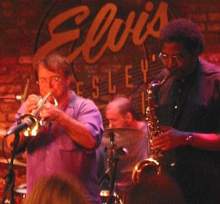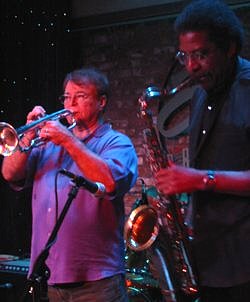 |
 |

Wayne Jackson knew Elvis from an early age, and not only played on some of Elvis' greatest songs but was also a visitor to Graceland and has some great insights into music and the man. First some essential Memphis musical background. Born in Memphis and raised across the river Wayne Jackson's love of music began with a guitar. But one night his mother came home with a trumpet for her 11 year-old son. "I opened up the case, and it smelled like oil and brass. I loved that, so I put it together, blew, and out came a pretty noise. My first taste of Sweet Medicine." The rest is music history. By 12th grade Wayne Jackson found himself playing with a group called The Mar-Keys. They had a number one instrumental smash called, 'Last Night.' It was 1961. What followed was a magical ride making music history with Otis Redding, Sam & Dave, Rufus Thomas, Isaac Hayes, all the soul greats. In 1969, Wayne and sax man, Andrew Love, became "The Memphis Horns" and found themselves working with a host of stars such as Neil Diamond, Aretha Franklin, B.J. Thomas and Elvis Presley.
EIN’s Piers Beagley was fortunate to meet Wayne Jackson and to spend some time with him chatting about soul music, life and Elvis. EIN – Thanks for sparing some of your valuable time & talking to us. Wayne Jackson – You know that I’ve been down there to Australia several times & I love it. If it wasn’t for family over here I could get lost down there! EIN – You’ve done a lot of touring in your time. I have recently been watching some of those great STAX shows of you in Europe. They are sensational. W.J – Oh man! We were 25 years old. Otis Redding, me & Andrew Love & Booker T & the MGs. We’d never been to Europe before and me being a country boy from the sleepy, cotton-town of West Memphis (Arkansas), even Memphis was a big deal. I had never been on a jet plane before and we had the biggest time you could imagine. But it was so hard to get any sleep there was always something to do. A lot of times we all felt like The Beatles ‘cos people were frantic to see us. To us it was just "family" but we had craziness & screaming fans all along the way. It was sure an eye opener.
EIN – Before you worked with Elvis you worked also on an incredible number of classic Memphis songs both at Stax and Chips Moman’s American Studios. W.J – It’s a shame that they tore down both those original studios. American Studios is a parking lot now! We’ve been going through the RIAA website and we’ve found 60 platinum rated records that I played on that the record companies haven’t awarded me yet!
EIN - It seems crazy that your horn sound is so identifiable in all those records yet you got less than $50! W.J – Luckily Wilson Pickett’s ‘Land of A Thousand Dances’ was General Motors theme song back in summer 2002 and so I made several thousand dollars that year, although I only got paid $65 to record it initially! EIN – There’s a very scary story about how an Otis Redding overdub saved your life? W.J – I remember that week (December 8th 1967) so well because I had gone out with Otis to Hernando’s Hideaway the Thursday night and he was such a nice young man - and just 2 days later he was dead. We had just worked on ‘Dock Of The Bay’ and Otis was going out on the road with his touring band The Barkays to do a live album. Andrew & I were supposed to go out to beef-up their sound but we had to stay and do the overdubs on ‘Dock Of The Bay’. So I was really supposed to be on that plane that killed Otis and the band – but having to stay back for the overdubs on ‘Dock Of The Bay’ saved my life! EIN – You had worked with so many of the great soul singers so did the booking for an Elvis session cause you any anxiety? W.J – To be honest with American Studios and the Elvis sessions, they were just plain recording sessions. The "Gods from Heaven" did not come down & there was no fire & brimstone either. It was just a recording session that just happened to be with Elvis. There was of course a lot more magic in recording Elvis than there was in recording a nobody but American studios had some great talent going through it at the time. The first time I actually heard Elvis sing ‘In the Ghetto’ however I was quietly sitting with my horn and looking at the music. I hadn't heard any of it yet and I suddenly realised that this was really special stuff. I just got a chill up my spine hearing that. I knew that it was going to be a landmark record for Elvis because it was about such a current topic. I thought "My God, here we all are genuinely in the ghetto!" There really was a guy with an automatic rifle on the roof in case of something bad happened - especially after Martin Luther King died. You see American Studios was in the worst part of town. Stax was a little nearer Graceland, but American & Hi studios, all of them were in the worst parts of town. ‘Suspicious Minds’ was also an emotional subject for Elvis at that time as well and it was a thrill to be involved in those songs, knowing that they would be so important to his future career as they were. EIN – Interestingly Dusty Springfield’s fabulous LP ‘Dusty In Memphis’ was released on the same day January 13, 1969 that Elvis came in to American Studios to record! Featuring the same line up as Elvis’ band wasn’t ‘Son Of A Preacher Man’ a stunner? W.J – It was one of the best of the era. There was so much music and also a lot of poverty and we all worked to earn something extra and I was one of those people. EIN – Were you brought in for sessions or did you play for whoever came along. W.J – Chips Moman produced Stax’s big early hit ‘Last Night’ and I played on that. He liked my horn sound and so anytime they needed horns at American they’d call us up. We also worked Muscle Shoals studios too! EIN – How did Chips Moman’s session work out since there were a lot of overdubs. Were you there when Elvis recorded the vocals? W.J – Next door was a restaurant & upstairs there was kid of a holding area. Because the studio was so small we would often go off with the Backing singers while the rhythm section worked out the backbone of the songs. We would be playing poker upstairs while they were cutting tracks downstairs. Then we would come down and Elvis would be singing and we'd put the horns in with the track. Elvis liked to sing with the horns and hear them together with the background vocals. So although we did overdub the horns on ‘In The Ghetto’ Elvis actually sang with us while we overdubbed those. You’ve got to understand that the studio was surprisingly small so that there was not much room for the band plus the horns & back-up voices. EIN – Like Sun Studios? W.J – Did you visit Sun Studios? Well it was just like that room - which still has all the magic hanging around in there. Sun Studios is probably the most important place in the world for Rock’n’roll and you can certainly feel that something very important happened in that room. I reckon you might even feel it even if you didn’t know what it was because there are such energies left over from all that creativity. But that all happened before I got into the business. I never got to play at Sun until Johnny Rivers did a session, Rufus Thomas too. We also worked with U2 when they recorded there in 1988 to produce their ‘Rattle & Hum’ album.
On our break we’d go outside and hang around with Elvis or whoever was with him in the parking lot. Elvis had that voice and the looks and he soaked up all kinds of music. He learnt a lot from everybody. EIN - Did you spend any time with Elvis at Graceland? W.J - Once in a while we’d go out to Graceland. At times we went to the movies late at night with him where we would have a caravan of cars and we'd all go to the Memphian. And sometimes we’d troop out to the Fairgrounds with him - which was a lot of fun. Elvis would want to ride that roller-coaster Zippin’ Pippin and so we'd all go ride the Pippin. Then when he tired of that we would all go to the bumper cars and everybody would ride them for a while. It was real fun, and it allowed everyone to relax much more than they could if we were all at his Graceland house. I remember one time waiting for Elvis to come down, sitting in an old gnarly Jungle Room chair and the damn thing nearly swallowed me up! We would sit around drinking Cokes, may be 15 or 20 of us, and sometimes he might not come downstairs 'til one O’clock in the morning. So eventually we’d get back around 5 or 6 in the morning but I would have to beg out as I’d have to be back in the recording studio at noon. Of course in retrospect now I wish I hadn't! But we were working really hard making hit records and I needed more than three or four hours sleep! EIN – How did you get to see so many of Elvis’ performances in Las Vegas. W.J – It just happened that I am a qualified pilot. Elvis’ cousin Bobbie Ayers was married to a wealthy real estate developer and I was the co-pilot of his Lear jet. So when Elvis would open in Las Vegas I would fly their Lear jet down there and we’d all go and see Elvis’ opening show. We would all sit in the big booth right in the front and we’d end up going back stage after every show for the whole week! We went every time Elvis opened. Since I had played on all the records, and Elvis had known me since I was a kid, we had a natural connection for talking and he’d also like to see Bobbie, so we would just party for the week. That went on once or twice a year for several years - they were the best times. EIN – Eventually you decided to move to Nashville. W.J – I moved to this home in 1977 - and I like it in Nashville. I like the hills and the way it feels and almost anywhere you go you run into songwriters. A swirling cauldron of musical people! Sadly it is not that way in Memphis anymore. In fact I was moving down to Nashville when I learned that Elvis was dead. I was shocked and suddenly thought that I was the last Memphis hold-out. American Studios was gone, Stax was gone, Hi studios was gone. Al Green wasn't making pop records any more and Steve Cropper had left town. All the people from American had left town, Reggie Young, Bobby Wood, Bobby Emmons and Chips Moman. They could have turned the lights out. It seemed to be all over. Otis Redding was dead - and now Elvis was dead. I was the last guy leaving Memphis. It was over, it really was the end of this era. EIN – Booker T & the MGs along with the Mar-keys was a great mixture of soulful black & white musicians. What do you think the black Memphians thought of Elvis? W.J - I sincerely believe that the black people respected Elvis’ success. Even if they didn’t respect all the songs that he sang, especially in those sixties movies, they respected his success. You have to. When you look back at the great songs that he sang, like ‘In The Ghetto’ and ‘If I Can Dream’ he was a truly great singer. Elvis was also a great gospel singer because he loved it and truly believed it. You know even in those movies I admire him for being "Elvis" no matter what his costume or his name was. I only wish that he had gotten a good movie role where he could have proved himself just one time. I honestly think he could have if he had lived long enough. One day someone would have finally let Elvis play a legitimate acting role! EIN – Sadly Elvis never got the chance. W.J – Yeah, in later years Elvis fell into bad habits. Those things he fell into will destroy and distort anyone. I don’t care how strong you are, drugs are bad. But deep down Elvis was a great example of what a Southern person was like. Elvis held his family values highly. He loved Mother - a typical Southern boy - He loved his Mother and his Daddy and God and the United States. And why not? Elvis came from Tupelo and turned into the "King of Rock’n’Roll" – It was the American Dream. EIN – Tell me about your company ‘Sweet Medicine Music’? W.J – I’ve been a songwriter since I was a kid and I’ve been playing my trumpet since I was 11. I love writing songs so I formed a publishing company called "Sweet Medicine Music." We had a major success back in 1999 with Amy Grant's version of ‘Christmas Can't Be Very Far Away’ which I wrote with Roger Cook. You know, I’ve come a real long way from when my parent’s house used to back up to a cotton patch and I practised my trumpet - since I thought that it was the only way I knew that might get me out of there. EIN - What have you been up to recently, have you been busy? W.J – I sure have. Firstly, I have just completed writing book two in my autobiographical series, "In My Wildest Dreams". The first book "Across The River To Memphis" dealt with Memphis in the 1960s, including my first glimpses of Elvis. The second book in the series, "The Memphis Horns" deals with Memphis in the 70's, Stax and even more glimpses of Elvis. Both books are very entertaining and, although not history books, they give lots of information and stories that you won’t find anywhere else! In the recording studio last year I spent time with Neil Young. We made a record called, "Prairie Wind" and a movie by the same name. I had a ball. Then you might have seen us on Saturday Night Live on TV where we performed some of the music from that movie! Wow, if you saw the show you know how much fun we had. And this year I wrote the horns for Tony Joe White’s new CD, "Uncovered." I know that you’ve met Tony - & let me tell you that he is as funky as always and he inspired me to do my very best work! I can’t wait for you to hear it! (EIN Note: Neil Young’s 'Prairie Wind' CD on Amazon.com gets the review.. "With Wayne Jackson of the soulful Memphis Horns...Neil Young has previously released a lot of albums in different musical styles, but Prairie Wind feels like a homecoming, and ranks with his very best") EIN – It’s great to know you’re still working as hard as ever & with such great performers. What a wonderful history you have. W.J – I tell you what it has been wonderful, it’s been great times - I don’t have any complaints! I have some pretty good friends. Please let me say hello to all the fans of Elvis in Australia & New Zealand and let me say that Elvis was truly a wonderful young man and they would have loved him personally had they met him.
For more info click here to go to Wayne Jackson's 'Sweet Medicine Music' Click here for EIN's interview with Tony Joe White Click here for EIN's interview with James Burton Click here for EIN's interview with Sweet Inspiration Myrna Smith. - Copyright Elvis Information Network 2006.Interview by Piers Beagley. DO NOT COPY ANY OF THIS MATERIAL © Copyright the Elvis Information Network Click here to comment on this interview EIN Website content © Copyright the Elvis Information Network.
Elvis Presley, Elvis and Graceland are trademarks of Elvis Presley Enterprises. The Elvis Information Network has been running since 1986 and is an EPE officially recognised Elvis fan club.
|
|
